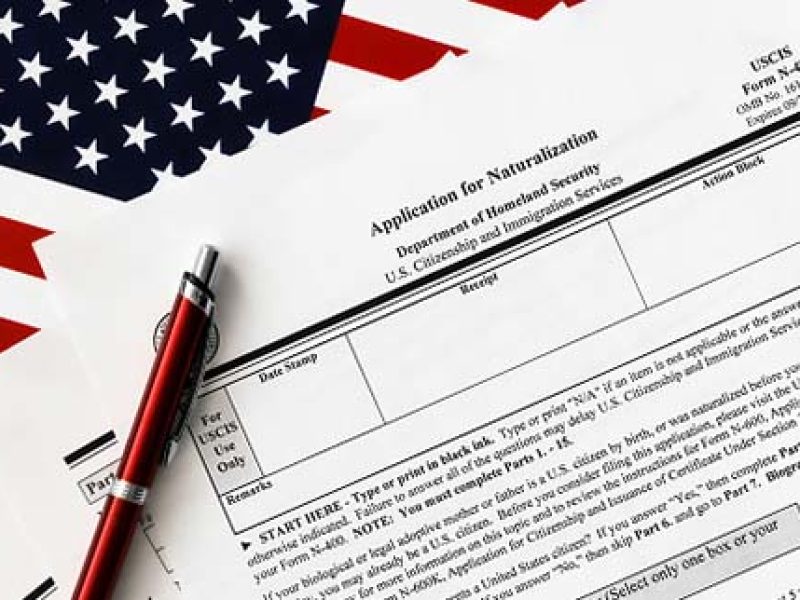How to Apply for Dual Citizenship in the U.S.
Applying for dual citizenship in the U.S. can be a complex process, but it offers many benefits for those seeking to maintain ties with their country of origin while enjoying the privileges of U.S. citizenship. Whether you are looking to acquire U.S. citizenship through naturalization or are seeking dual citizenship through descent, the application process involves several important steps. Below is a detailed guide on how to apply for dual citizenship in the U.S., the documents you’ll need, how to retain your original citizenship, and the role immigration lawyers can play in the process.
Documents Needed for Dual Citizenship Applications
The documentation required to apply for dual citizenship can vary depending on the country of origin and the specific circumstances of the applicant. However, there are several key documents that are typically required in the U.S. application process:
Proof of Citizenship in the Other Country: If you are applying for dual citizenship through your country of origin, you will need to provide evidence of your citizenship. This could include a passport, national identity card, or a birth certificate issued by the country of your other citizenship.
U.S. Immigration Documents: If you are applying for dual citizenship as a naturalized U.S. citizen, you will need to submit your naturalization certificate or permanent resident card (green card) to show proof of your U.S. status.
Form N-400 (Application for Naturalization): This form is typically required if you are applying for U.S. citizenship through naturalization. You will need to fill out this form thoroughly and submit it along with supporting documents, including your green card, proof of residency, and tax returns.
Proof of Residence and Physical Presence: To show your eligibility for naturalization, you may need to provide documentation demonstrating that you have met the residency and physical presence requirements. This could include lease agreements, utility bills, and travel records.
Passport and Identification: If applying through descent or birthright, you may need to provide your passport and national ID card to demonstrate your identity and citizenship status.
Proof of Family Connection: If you are applying for dual citizenship based on descent (e.g., through your parents or grandparents), you may be required to submit birth certificates, marriage certificates, and other family documents to prove your ancestral connection.
FBI Background Check or Police Clearance: As part of the application process, you may be required to submit a background check or police clearance from any country where you’ve lived for a significant amount of time.
It’s essential to check with the relevant U.S. government agencies or the consulate of the other country to ensure you have all the necessary documents for your specific situation.

Steps to Retain Your Original Citizenship
Retaining your original citizenship while acquiring U.S. citizenship can sometimes be challenging, depending on the laws of your home country. Many countries allow dual citizenship, but others may require you to renounce your citizenship if you become a citizen of another nation. Here are some important steps to help you retain your original citizenship when applying for dual citizenship in the U.S.:
Understand the Laws of Your Home Country: Before applying for dual citizenship, it’s crucial to understand the laws of the country of your original citizenship. Some countries allow you to keep your citizenship when acquiring another, while others may require you to give it up. Review the policies of your home country and speak with legal professionals if needed.
Check for Dual Citizenship Provisions: Some countries, like the U.S., explicitly allow for dual citizenship, meaning you can hold citizenship in both countries without needing to renounce your original citizenship. If your home country recognizes dual citizenship, you should be able to keep both nationalities without issue.
Notify Authorities if Required: In some countries, you may be required to inform the government about your intention to acquire another nationality. In these cases, you’ll need to follow the procedures laid out by your home country’s immigration or citizenship office to retain your citizenship.
Renounce Other Nationalities Only If Necessary: If the country of your original citizenship requires you to renounce your nationality upon acquiring U.S. citizenship, you’ll need to formally submit a declaration of renunciation. This decision should be made carefully, as renouncing your citizenship can have significant legal and financial implications.
Maintain Ties with Your Home Country: Even if you don’t lose your original citizenship, it’s a good idea to keep documentation and legal ties intact with your home country. For example, you may want to keep your original passport active and follow any applicable laws, such as paying taxes or registering with local authorities.
The Role of Immigration Lawyers in the Application Process
Applying for dual citizenship can be a complicated and often lengthy process, especially when navigating the laws and requirements of multiple countries. Immigration lawyers can play a crucial role in ensuring that your application is completed correctly and efficiently. Here’s how an immigration lawyer can assist you in the dual citizenship application process:
Expert Guidance on Eligibility: An immigration lawyer can help you determine whether you meet the eligibility criteria for dual citizenship. They can assess your situation, review your immigration history, and advise you on the best way to pursue your application.
Assistance with Documentation: Gathering the right documentation for dual citizenship can be overwhelming, especially when you’re dealing with multiple countries’ legal systems. An immigration lawyer can help ensure that all your documents are in order, correctly filled out, and submitted to the appropriate authorities.
Navigating Legal Complexities: If you’re seeking dual citizenship through family ties or descent, an immigration lawyer can assist in verifying and compiling necessary proof of lineage. Additionally, if you face complications, such as conflicts between countries’ laws, a lawyer can help navigate these issues and represent your interests.
Preparing for Interviews and Applications: In some cases, you may be required to attend an interview or provide additional information as part of the application process. An immigration lawyer can help you prepare for these steps, ensuring that you are fully prepared for any legal proceedings.
Ensuring Compliance with Tax and Legal Obligations: Dual citizenship often comes with unique legal and tax obligations. An immigration lawyer can provide advice on how to comply with the regulations of both countries and help you understand any potential tax consequences or other legal implications.
Resolving Issues Related to Dual Citizenship: If you encounter any challenges, such as the loss of original citizenship or a refusal of your application, an immigration lawyer can help address these issues and represent you in legal proceedings.
Given the complexity of dual citizenship laws and the importance of getting it right, hiring an immigration lawyer can be a wise investment for anyone navigating this process. Their expertise ensures that your application is smooth, timely, and legally sound.
Dual Citizenship and U.S. Immigration Law
Dual citizenship is a complex legal status that can have various implications under U.S. immigration law. While the U.S. generally allows its citizens to hold multiple nationalities, there are certain legal considerations that individuals should be aware of. This section explores how the U.S. views dual citizenship and how it can impact an individual’s immigration status.
How the U.S. Views Dual Citizenship
The United States follows a permissive stance on dual citizenship, meaning that it does not require individuals to renounce their original nationality when acquiring U.S. citizenship. The U.S. government acknowledges that a person may hold citizenship in another country while also being a U.S. citizen, whether by birth or naturalization. However, there are a few important points to consider:
No Formal Recognition, but No Prohibition: The U.S. does not formally encourage or regulate dual citizenship, but it does not penalize individuals who hold multiple nationalities. This means that a dual citizen is still considered a full U.S. citizen under American law, regardless of any obligations they may have to another country.
Obligations and Responsibilities: A dual citizen must comply with U.S. laws, including taxation, military service (if applicable), and travel regulations. For example, all U.S. citizens, even those holding another nationality, are required to enter and leave the U.S. using a U.S. passport.
Potential Issues with Foreign Governments: While the U.S. allows dual citizenship, some other countries do not. If an individual’s home country does not permit dual nationality, they may be required to renounce their U.S. citizenship or take specific legal steps to maintain both.
Limited U.S. Government Protection Abroad: Dual citizens traveling on a foreign passport may have limited access to U.S. diplomatic protection in their other country of nationality. If a country considers a person as solely its own citizen, the U.S. government may not be able to intervene on their behalf in legal or political matters.
Overall, while the U.S. does not impose significant restrictions on dual citizenship, individuals should be aware of the potential legal and practical implications when holding nationality in more than one country.
Impact of Dual Citizenship on U.S. Immigration Status
Dual citizenship can have both advantages and challenges for individuals navigating the U.S. immigration system. Understanding how U.S. immigration law interacts with dual nationality is essential for those considering naturalization or maintaining legal residency in multiple countries.
Naturalization and Retaining Dual Citizenship: Those seeking to become U.S. citizens through naturalization are required to take an Oath of Allegiance to the U.S. This oath includes a statement about renouncing allegiance to other nations. However, in practice, the U.S. does not enforce renunciation, and many individuals retain their original nationality if their home country allows it.
Effect on Green Card Holders: Lawful permanent residents (green card holders) who wish to obtain U.S. citizenship must ensure they meet residency and physical presence requirements. Holding dual citizenship may complicate these factors if they spend extended time in their other country of nationality, which could lead to issues when applying for naturalization.
Travel Restrictions and Visa-Free Access: Dual citizens may enjoy greater travel freedom, as they can use both passports to access different countries without visas. However, some nations impose restrictions on dual nationals, such as barring them from entering on a U.S. passport if they are also a citizen of that country.
Military Service and Government Jobs: Some government jobs and security clearances in the U.S. require applicants to hold sole U.S. citizenship. Additionally, some countries require their citizens to serve in the military, which could create conflicts if a dual citizen is subject to service obligations in both countries.
Impact on Family-Based Immigration: Dual citizens can sponsor family members for U.S. immigration benefits, such as green cards for spouses or relatives. However, dual nationals must ensure they meet the financial sponsorship requirements and comply with U.S. immigration laws when petitioning for family members.
Possible Loss of U.S. Citizenship: While rare, U.S. citizens who voluntarily obtain foreign citizenship with the intent to relinquish their U.S. nationality may lose their American citizenship. This is assessed on a case-by-case basis, and intent must be clearly demonstrated.
Understanding these immigration-related factors is crucial for individuals considering dual citizenship with the U.S. While it offers numerous advantages, it also carries specific legal responsibilities that must be carefully managed.
Renouncing Dual Citizenship: When and Why to Consider It
While dual citizenship offers many advantages, there are circumstances where individuals may choose—or be required—to renounce one of their nationalities. Whether due to legal, financial, or personal reasons, renouncing citizenship is a significant decision that comes with long-term consequences. This section explores the common reasons for giving up a nationality and the formal process involved.
Reasons for Renouncing Dual Citizenship
There are several reasons why someone might decide to renounce their citizenship in one of their countries of nationality. These reasons can range from financial obligations to legal restrictions imposed by governments.
Taxation and Financial Burdens: Some countries, including the U.S., impose worldwide taxation on their citizens. This means that even if a U.S. citizen lives abroad, they must still file U.S. taxes, report foreign income, and comply with financial disclosure laws. To avoid complex tax obligations, some individuals choose to renounce their U.S. citizenship.
Legal Conflicts and Restrictions: Certain countries do not permit dual nationality and may require individuals to renounce foreign citizenship upon naturalization. If someone wishes to fully integrate into a country that mandates single nationality, they may need to renounce their other citizenship to comply with local laws.
Military and Political Obligations: Some countries impose mandatory military service or other civic duties on their citizens. Dual nationals may face conflicts if they are legally required to serve in two different countries’ armed forces. Similarly, certain nations restrict government positions and political rights to sole citizens, making renunciation necessary for career advancement.
Security Clearance and Employment: In some cases, holding dual citizenship can be an obstacle for individuals seeking high-security government jobs or positions requiring special clearance. U.S. federal agencies and defense contractors, for example, often require employees to be U.S.-only citizens.
Personal and Emotional Factors: Some individuals may feel a stronger connection to one nationality and prefer to align their legal status with their cultural identity. Others may want to simplify travel, legal paperwork, or inheritance matters by holding only one citizenship.
While renouncing citizenship is a serious decision, it can sometimes be the best option for individuals facing legal conflicts or financial challenges.
The Process of Renouncing Citizenship
The procedure for renouncing citizenship varies by country, but it generally involves formal applications, legal declarations, and government approvals. Below are the typical steps for renouncing U.S. citizenship, which serves as an example of the process in many nations.
Determine Eligibility and Consequences: Before renouncing U.S. citizenship, individuals should consult with legal and financial advisors to fully understand the consequences. Renouncing citizenship is irreversible in most cases, and it may lead to losing certain rights, such as the ability to return to the country without a visa.
Schedule an Appointment at a U.S. Embassy or Consulate: Renunciation cannot be done online or by mail—it must be conducted in person at a U.S. embassy or consulate in a foreign country. Individuals must schedule an appointment and bring the required documentation.
Complete Form DS-4079 (Request for Determination of Possible Loss of U.S. Nationality): This form is used to assess whether the renunciation is truly voluntary. Additional forms, such as DS-4080 (Oath of Renunciation) and DS-4081 (Statement of Understanding), must also be completed.
Attend an Interview and Take the Oath of Renunciation: At the appointment, individuals will be interviewed by a consular officer to confirm that they understand the implications of renouncing citizenship. They must then sign an oath formally giving up their U.S. nationality.
Pay the Renunciation Fee: As of recent updates, the fee for renouncing U.S. citizenship is $2,350. This fee must be paid at the time of renunciation and is non-refundable.
Receive a Certificate of Loss of Nationality (CLN): If the U.S. government approves the renunciation request, the individual will receive a Certificate of Loss of Nationality (CLN), which serves as proof that they are no longer a U.S. citizen. This document is essential for immigration purposes and proving their new legal status.
Important Considerations
Statelessness Risk: If an individual renounces their citizenship without securing another nationality, they may become stateless, meaning they have no legal protection from any country. Stateless persons often face severe travel restrictions and difficulties obtaining legal documents.
Visa and Reentry Rules: Once citizenship is renounced, the former citizen may need a visa to reenter the country. For example, ex-U.S. citizens must apply for a visa or an ESTA authorization (if eligible) to visit the United States.
Tax and Exit Obligations: The U.S. requires some expatriates to file a final tax return and possibly pay an exit tax if they have significant financial assets. Other countries may have similar financial requirements.
Renouncing citizenship is a serious legal decision with long-term implications. Individuals considering this path should carefully weigh the pros and cons before proceeding.
Conclusion
Dual citizenship offers a unique blend of opportunities and challenges, allowing individuals to enjoy expanded travel, economic advantages, and cultural connections while also navigating complex legal and financial obligations. Whether seeking dual nationality for personal, professional, or family reasons, understanding the eligibility requirements, application process, and potential complications is essential. Likewise, those considering renouncing citizenship must carefully evaluate the long-term consequences before making such a life-changing decision. Given the evolving nature of immigration laws and international policies, consulting with legal and financial professionals can help ensure a smooth process. Ultimately, dual citizenship is a powerful status that, when managed wisely, can provide significant benefits across multiple aspects of life.
FAQ
What is dual citizenship?
Dual citizenship, also known as dual nationality, means that a person is legally recognized as a citizen of two countries at the same time. This status grants individuals the rights and responsibilities of both nations, such as the ability to hold two passports, vote in elections, and access social services.
Does the U.S. allow dual citizenship?
Yes, the United States permits dual citizenship. It does not require individuals to renounce their original nationality when becoming a U.S. citizen. However, some countries do not allow dual citizenship, so it is essential to check the laws of your home country before applying.
How can I apply for dual citizenship in the U.S.?
The process of obtaining dual citizenship varies depending on your current nationality. Generally, it involves:
Becoming a naturalized U.S. citizen while maintaining your original nationality (if allowed by your home country).
Applying for citizenship in another country while retaining your U.S. nationality.
Meeting specific residency, legal, and application requirements set by the country of interest.
What are the benefits of dual citizenship?
Dual citizens can enjoy:
– The freedom to live, work, and travel between two countries.
– Access to healthcare, education, and social benefits in both nations.
– Expanded career and investment opportunities.
– The ability to vote and participate in civic duties in both countries.
What are the challenges of dual citizenship?
Some difficulties associated with dual nationality include:
Double taxation obligations in both countries.
Conflicts between the legal systems of both nations.
Potential mandatory military service in one of the countries.
Travel restrictions if diplomatic relations between the two nations deteriorate.
Will my children automatically get dual citizenship?
It depends on the laws of both countries. Some nations grant citizenship by birthright (jus soli), while others pass it through descent (jus sanguinis). If one or both parents hold dual nationality, children may be eligible for citizenship in both countries, but additional registration may be required.
Can I lose my original citizenship after becoming a U.S. citizen?
The U.S. does not require new citizens to renounce their previous nationality, but some countries automatically revoke citizenship when an individual becomes a citizen of another country. It is crucial to verify the specific laws of your home country before naturalizing in the U.S.
How does dual citizenship affect my taxes?
Dual citizens must comply with tax laws in both countries. The U.S. taxes its citizens on worldwide income, meaning you may need to file tax returns in both countries. However, tax treaties and foreign income exclusions can help avoid double taxation. Consulting a tax professional is highly recommended.
Can I hold two passports as a dual citizen?
Yes, dual citizens can legally possess passports from both countries. This allows greater travel flexibility, as they can enter and exit each country as a citizen rather than a foreign visitor. However, some nations restrict or prohibit the use of multiple passports.






